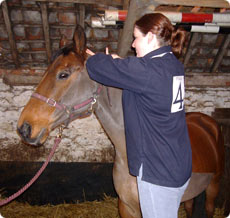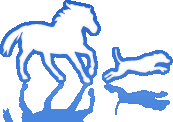McTimoney Therapy
Why Your Horse May Need McTimoney Therapy
Horses did not evolve specifically to carry weights on their backs, and modern competition places even more strain upon their skeletal structure.
Your horse will generally let you know if it is feeling discomfort when ridden if the problem is sudden and painful, but longstanding problems may result in the horse compensating by altering the way it moves.
Common signs of back pain include:
- Resistances: bucking, rearing, napping or bolting
- Unlevelness, particularly behind
- Reduced quality of paces, inability to extend / collect the stride
- Deterioration in performance
- Temperamental changes, such as loss of interest in work, lethargy, or grumpiness
- Inability to stand square
- Refusal to jump, running out, or rushing jumps
- Hollowing of the back and inability or refusal to work on the bit
- Asymmetry: Disunited/ / incorrect canter lead, stiffness on one rein, reluctance to bend, tilting the head
- Inability to carry out lateral work correctly
- Uneven shoe wear caused by toe dragging or scuffing
- Lameness after a fall of accident, where alternative causes have been eliminated
Equine spinal problems can be caused by a one-off event (acute injury) or something which has built up over a period of days, week, months or even years (chronic injury).
Acute injuries may be caused by:
- Trips, falls or slips
- Sharp turns
- Hitting a fence while competing/hunting
- Accidents
- Getting cast in the stable
- Fighting with other horses
Chronic injuries may be due to:
- Conformational faults, such as a long, weak back
- Ill-fitting tack
- Dental problems
- Poor shoeing, or problems with the feet
- Excess weight, or an unbalanced rider
- Overly hard or soft going, or concussive forces due to roadwork
- Repetitive work
Most horses will benefit from a maintenance check every 6-8 months, and also after injury or a period of lameness. This is because gait alterations caused by lameness can place more strain on other parts of the equine structure. Mares will also benefit from treatment after foaling, as this can affect the pelvis.
For performance horses, treatment is recommended at the beginning and end of a competition season, after injury or lameness, or at 4-6 monthly intervals.

From cats to cattle, rabbits to sheep, McTimoney therapy can benefit all animals...







